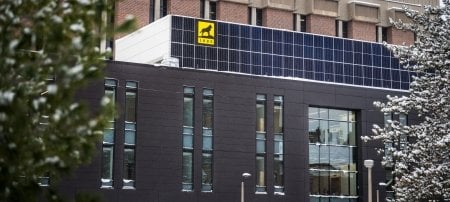They're Melting
Monitoring Chile’s shrinking glaciers
Along the eastern edge of the long, narrow nation of Chile, the Andes mountains reach for the sky. And on those towering peaks are hundreds of glaciers.
Those glaciers serve as icy reservoirs for downstream populations, which rely on their annual melt for drinking water, irrigation, and industry. But as the Earth warms, glaciers in the southern Andes are shrinking at unprecedented rates, posing critical questions for Chilean authorities.
How fast are they melting? How much are they moving? How much solar energy do they absorb? As part of an extensive, ongoing study, Chris Roussi, a senior research scientist and engineer at the Michigan Tech Research Institute, is helping find answers.
“The glaciers are the canary in the coal mine for global warming in Chile,” Roussi explained. Chile has no doubt that global warming is happening, he said. They regard it as a real threat, and they urgently want to know how it is going to affect them.
Contributing his expertise in hardware and software, Roussi was part of a US Geological Survey–led team that designed sensors to track the melt and movement of the gigantic Bering Glacier in Alaska.
So when the US Department of the Interior funded a remote-sensor project for Chile’s glaciers as part of its International Technical Assistance Program, Roussi was tapped to teach the Chileans to install and monitor five sensors, which were built in Ann Arbor at the Michigan Tech Research Institute. Four are installed in the Andes, and plans are in the works to put one in Antarctica.
They will beam data hourly to a satellite network, which in turn will relay that data to Chilean scientists. That does more than save the cost of traveling to the glaciers to take readings. The project also will ultimately provide accurate, timely information to help Chilean decision makers address a looming environmental crisis.
Michigan Technological University is a public research university founded in 1885 in Houghton, Michigan, and is home to more than 7,000 students from 55 countries around the world. Consistently ranked among the best universities in the country for return on investment, Michigan’s flagship technological university offers more than 120 undergraduate and graduate degree programs in science and technology, engineering, computing, forestry, business and economics, health professions, humanities, mathematics, social sciences, and the arts. The rural campus is situated just miles from Lake Superior in Michigan's Upper Peninsula, offering year-round opportunities for outdoor adventure.



